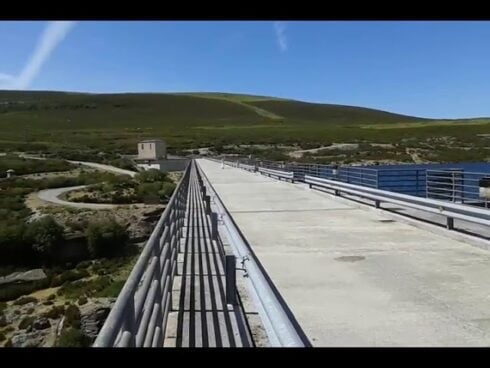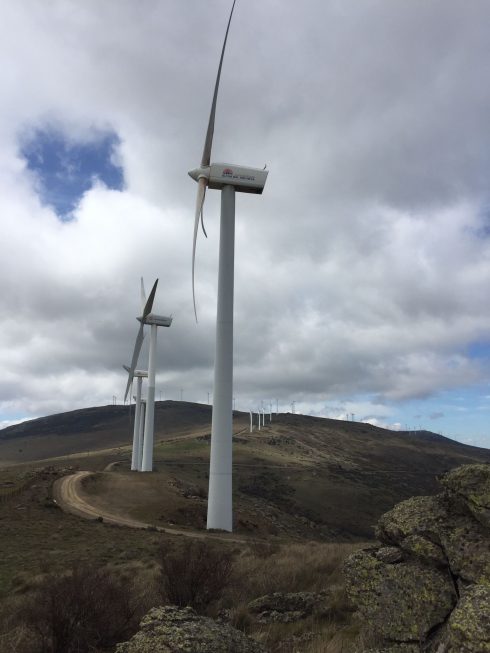*But were Afraid to Ask.
With the news that up to 85 per cent of Andalucia is under threat from desertification, in this simple Q&A scientist AZZAM QASRAWI explains the phenomenon of climate change … while next issue explaining how we can combat it

WHY should I be interested in Climate Change? Simple, because today it is the most important threat facing mankind, on a level with nuclear war. And even more so for us foreigners who live in Andalucía, as this is one of the regions in Europe that stands to see the most dramatic effect.
This will happen over the next few decades, and will translate into increased maximum and minimum temperatures and decreasing rainfall. You do not need to be a scientist to understand that this will simply lead to increased desertification, estimated at a recent conference in Madrid to go from 28 per cent today to 85 per cent.
An Easy Primer to global warming in Ten Questions and Answers.
What is Climate Change?
Climate Change or Global Warming, is a general change in the Earth’s Climate that is leading to important increases in the temperature of the Earth surface and of the oceans. This increase in temperature, relative to pre-industrial levels, is leading to an increase in the global sea level; to a reduction in snow cover of the northern hemisphere, and to increasing severity of up normal weather phenomena, like storms, hurricanes and flooding.
What is causing Climate Change?
 Climate change is mainly due to human activities starting with the Industrial Revolution. These activities have resulted in an increase in concentrations of long-lived greenhouse gases (mainly carbon dioxide, methane and nitrogen oxide ) by 35 per cent for carbon dioxide, to more than 100 per cent for methane compared to pre-industrial level.
Climate change is mainly due to human activities starting with the Industrial Revolution. These activities have resulted in an increase in concentrations of long-lived greenhouse gases (mainly carbon dioxide, methane and nitrogen oxide ) by 35 per cent for carbon dioxide, to more than 100 per cent for methane compared to pre-industrial level.
Greenhouse gases result mainly from burning fossil fuels for electricity generation; for heating and for industrial activities. These gases basically trap the sun energy in the atmosphere and in the oceans, unbalancing the Earth’s thermal equilibrium and leading to Global Warming.
How do we know Climate Change is Happening?
Scientists have been doing reliable measurements of average surface temperature, sea level and snow cover since 1850, 1870 and 1920 respectively.
In addition, they have been doing increasingly-sophisticated modelling of the climate ie simulating the influence of various parameters, like concentration of greenhouse gases, solar radiation, reflectivity of the earth surface, aerosols in the air etc on the Earth’s energy balance.
They also use these models for predicting the possible future Climate Change with different scenarios of emissions of greenhouse gases.
More and more precise measurements, not only using surface stations but also balloons and satellites, agree very well with simulations, which are in turn becoming more realistic and reliable.
How much has the Earth warmed up so far?
Over the period of the 20th century, the average global temperature of the Earth has increased by roughly three quarters of a degree Celsius. Most of this happened over the last 50 years, indicating that change is accelerating. Eleven of the past 12 years were the warmest since reliable records began.
Due to this rise in temperature and due to the melting of polar ice sheets, sea levels are rising by three centimetres every decade, and this rise is accelerating. Since 1870, the sea level has risen globally by 20 centimetres.
The Arctic Sea is losing almost 3 per cent of its ice every decade. This loss could well become higher, due to catastrophic disintegration of polar ice sheets.
How much further will the Earth warm up over the rest of this century?
It all depends on whether we continue to emit more greenhouse gases or do something to reduce these emissions.
Over the next 20 years, scientists predict that the Earth’s temperature will continue to rise (assuming realistic emissions of greenhouse gases) by 0.2 degrees Celsius every decade.
Afterwards and over the rest of this century, the increase in temperature will be strongly influenced by the future rate of greenhouse gases’ emissions.
The best estimate of the increase in global temperatures ranges from 1.8 degrees for a low emission scenario to 4 degrees for a high-emission scenario. To put these numbers in perspective, the rise in temperature of the Earth since the last ice age terminated 11,000 years ago was only 5 degrees.
It is also predicted that the sea level will rise during the 21st Century by a further 30 to 40 centimetres, depending on the level of emissions. Possible acceleration of the loss of ice from Greenland and Antarctic ice sheets could add 10 to 20 centimetres or more to this rise in sea level.
Could Global Warming be due to natural phenomena that we cannot control?
Yes, but only partially; changes in solar output and major volcanic eruptions can contribute positively or negatively to Global Warming. When only these natural phenomena, over the last 100 years, are considered in the climate models, the results do not explain the observed rises in temperature or sea level.
Only when man-made factors are also taken into account do we get a best fit between simulations and measurements.
Increase in solar radiation is thought to contribute no more than 7 per cent to the net warming resulting from natural and man-made effects.
Can certain man-made effects result in Global Cooling, offsetting the warming produced by greenhouse gases?
Yes, two main factors can lead to cooling, increasing reflectivity of the Earth’s surface of sunlight due to land use, and the presence of large amounts of aerosols (airborne particles from natural or man-made sources), which reflect sunlight and increase cloud cover.
Felling trees, covering large areas of the Amazon or other forests, can increase reflectivity of the Earth surface. The effect is, however, small and uncertain compared to the warming from greenhouse gases. This small beneficial effect has to be looked at in the light of other more negative effects, like soil erosion, increased greenhouse gases from burning or decay of plants, and loss of vital habitat for rare animal and plant species. It is hardly realistic to argue for all the Earth’s forests to be cut down and turned into deserts, to somewhat postpone Global Warming.
Cooling effects of aerosols are important but, again, smaller than the warming effects of greenhouse gases and have to be balanced with the more negative effects on the health of humans. They are also the least understood of factors affecting climate change and, hence, have to be treated with utmost caution. We cannot conduct a vast experiment on the Earth, in the forlorn hope of again postponing Global Warming, using uncertain technologies.
Are Scientists now more confident in their predictions of Global Warming than before, and if yes why?
Yes, scientists are now more confident than six years ago in their understanding the causes of Climate Change, of its attribution to essentially man-made factors and in the prediction of its consequences on the planet.
This increased confidence comes from more precise measurements and experiments from all over the globe, and from improved and more realistic representations of climate processes in the simulations. These measurements and simulations come from many research groups and thousands of expert scientists from all over the world.
In a 2001 report of the Intergovernmental Panel on Climate Change (IPCC), it was concluded that it was likely (more than 66 per cent probable) that most of the warming in the second half of the 20th century was attributable to humans. The 2007 report of the IPCC goes much further, upping this to very likely (more than 90 per cent probable).
What will the consequences of Global Warming be on the planet as a whole?
The consequences of Global Warming will vary from region to region. It is certain, however, that the health and welfare of hundreds of millions of people will be negatively affected around the world.
These consequences include:
*more frequent heat waves; droughts; fires; coastal flooding; avalanches and storms.
*some infectious diseases, like malaria, will spread to new regions.
*high concentration of ground-level ozone will increase heart and respiratory ailments.
*by the 2080s, rising sea levels will flood the homes and fields of tens of millions of people, especially in the large deltas of Asia and Africa and on small islands.
Recent estimates by eminent economists suggest that the combined effects could lead to the loss of 5 to 20 per cent of the world’s economic output.
What will the consequences be in Spain in general and especially in Andalucía?
In Spain and in the south of Europe in general, there will be more health-threatening heat waves and wildfires; reduced availability of water and hydro power potential; reduced crop production and reduced summer tourism.
It is estimated that rainfall could go down by up to 40 per cent by 2050. Average summer temperatures in Andalucía could go up by up to 7 degrees, by 2070.
The European Union estimates the potential loss in summer tourism in the south of Europe as a whole to be up to 100 billion euros annually.
Well, what can be done to mitigate the effects of Global Warming?
Of course, this is a vast question, but it has specific answers. We leave these to the second part of this article. What is certain is that we can slow down Global Warming and mitigate its damaging effects, but we have to act now, globally and on very many fronts.
The bottom line is that the world must stabilise and then reduce its emissions of greenhouse gases to cap their concentration in the atmosphere to manageable levels. The health and well-being of every human being depends on this prompt and desperately-needed action.









In the 60s I read in a major New Zealand Newspaper that scientists were worried about the USA `tickling the Ionisphere because that could cause it to tear.
The Ionisphere was described as similar to the membrane holding fluids to protect a baby in the womb.
Today we hear this electromagnetic energy that is being directed at the Ionisphere has been vastly increased so that it is actually boiling the Ionisphere & tearing it.
When the Ionisphere is torn Space Energy is concentrated on areas under this (on earth) & one must question, Is this how whole lakes disappear overnight, like they have had a plug pulled out?
It is said that this method would kill everything it was directed upon.
Let me remind you that if indeed the world is facing a potential catastrophic Global Warming & the real powers behind all thrones were concerned, they would be falling over themselves to revive technologies they have deliberately hidden from the main populations.
Over the centuries many ingenious inventors have been Ignored, Harrassed, Beaten, Shot at, Killed, Burnt out (of home or factory) or Financially & Emotionally broken as they have watched their lifes work sabotaged.
Why would this be necessary if they hadnt produced anything worth having?
What about the very recent findings of the Irishmen who challenged scientists to check their findings for free energy?
They were astute enough to NOT TRY TO GET A PATENT for discovering by accident the FREE ENERGY TESLA discovered so long ago, when the knowledge was first forcibly suppressed.
The `Powers’ would immediately stop Felling Forrests that produce oxygen, Use Tesla’s knowledge to run vehicles & electricity, stop using the Sea as a dumping ground
The truth is these `Globals’ fully intend OWNING ALL WEATHER AROUND THE WORLD & they intend holding us all to ransom until this is agreed & they can then pretend they are our saviours.
Most talk about Global Warming is all garbage & I wish people would not buy into this because it keeps the ignorant ignorant.
Yours most sincerely
Judith Kellogg
PS
Former secret papers revealed that the USA was in New Zealand in 1945 & 46 creating Tsunami’s to use as war bombs. (AT Army Bay, on the Whangaparoa Peninsula, Auckland)